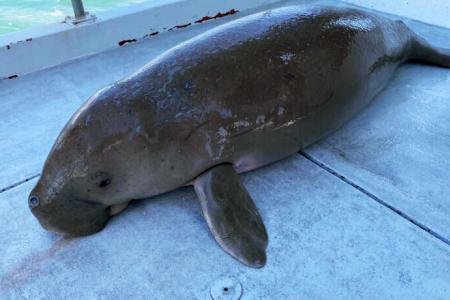Young dugong found dead in S'pore waters
SINGAPORE - There were no visible signs on the carcass of the young dugong found dead in Singapore waters on Saturday (Oct 9) to indicate that it died from physical trauma.
But the National Parks Board (NParks) said it is continuing to work with the National University of Singapore's (NUS) Lee Kong Chian Natural History Museum and the NUS Department of Biological Sciences to investigate the cause of death of the marine mammal.
The critically endangered creature had been found dead and floating in the waters by a group of recreational divers off Pulau Hantu, one of Singapore's southern islands, on Saturday morning.
Dr Karenne Tun, director of NParks' coastal and marine branch, said a post-mortem conducted on Saturday by NParks' Animal and Veterinary Service found no visible signs to indicate that the death of the young dugong was caused by physical trauma.
But she added: "As young dugongs are known to stay close to their mothers until they reach maturity, the calf may have been separated from the mother before its demise."
Mr Marcus Chua, a mammal researcher at the museum, said the dead dugong was male and measured about 1.4 m. Adult dugongs can usually reach lengths of between 2.4m to 4m.
Mr Chua said dugongs usually stay with their mothers and receive care for a long time.
"If the dugong had been separated from its mother, it might not have been able to survive," he told The Straits Times.
This is because dugong calves need a combination of sea grass, which is their natural diet, and their mother's milk for nutrition.
Their mother's care is also crucial in teaching them how to survive in the wild independently.
As maternal dugongs do not abandon their children, the pair were likely separated due to challenging conditions, Mr Chua said, citing possibilities such as poor tidal conditions or the premature death of its mother from other causes.
During the post-mortem, which Mr Chua had assisted on, the researchers found that the stomach was full, suggesting that it had been feeding before its death.
Further investigation done on the contents in the calf's stomach will help them ascertain the cause of death.
"Although this event is sad, finding the carcass of this calf is evidence that dugongs are breeding in Singaporean waters," said Mr Chua.
"Hopefully the findings of this investigation can better contribute to protecting dugongs in our waters."
Get The New Paper on your phone with the free TNP app. Download from the Apple App Store or Google Play Store now


